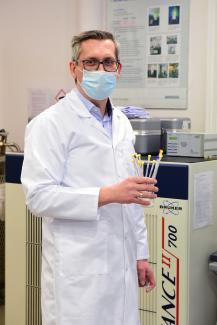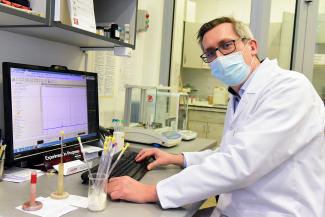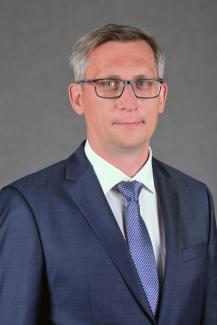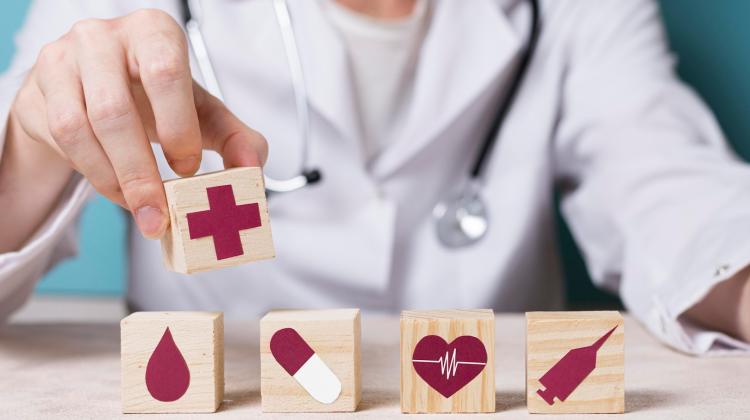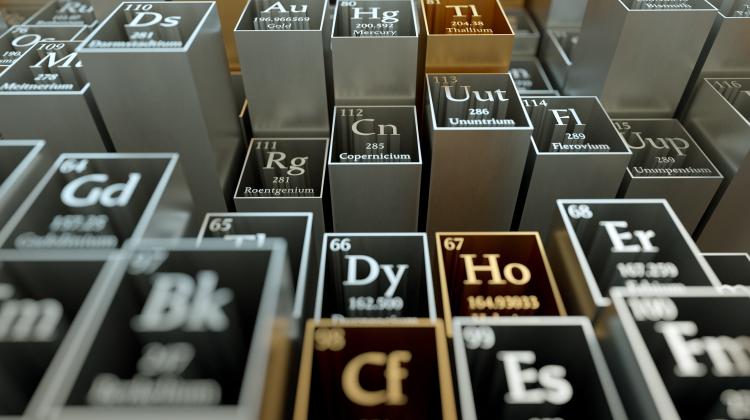Today's holiday turns the spotlight on scientists. When did you develop a passion for chemistry?
We could even say love. My extremely dedicated chemistry teachers at primary and secondary school are responsible for this fascination. On the other hand, I have always been curious about the world and its phenomena, and chemistry allows you to know them very well. I was particularly interested in organic chemistry, which I have been practicing with satisfaction to date.
With your excellent grades and such interests, didn't you think about medicine?
My mother is a doctor and I think that for many people my only choice of studies was chemistry at Lodz University of Technology. My dad, in turn, is a graduate of the Faculty of Mechanical Engineering at Lodz University of Technology, so the choice of this university was natural for me. I did not apply anywhere else. I have never regretted this decision. Answering this question, I would also like to appeal to young people to not be afraid to follow their interests and passions when choosing studies. I think it's worthwhile to pursue chemistry, physics or engineering sciences, looking for inspiration in medicine, for example. Lodz University of Technology is a perfect place to develop and pursue such passions.
You graduated from the Faculty of Chemistry in 2004 and received your professorship in 2019 at the age of 39. Your scientific work has been very intense and successful, with a specialization in asymmetric catalysis. To the layman, this sounds mysterious. Please explain what this process consists of?
We are dealing with a phenomenon of science, which is chirality. This is the property that an object and its mirror image cannot be superimposed on each other. You can think of this in terms of hands that, although they are mirror images of each other, when you try to overlap them, they don't match as perfectly as you would think. Chirality of objects is identified at the molecular level. Changing only the spatial structure of molecules translates into huge differences in their biological activity. Many times it is the case that one spatial form of a molecule may have beneficial properties and another may not exhibit them or be harmful. An example is the trendy sweetener aspartame. One of its spatial forms is sweeter than sugar, while its mirror image has a bitter taste.
In our daily laboratory activities, we are inspired by nature. By imitating the chemical and stereochemical action of enzymes that promote various transformations in our organisms, we try to design new catalysts and reactions that can be tools for preparing new drugs or plant protection products
What else does your research team do?
Another area of our work is an analytical technique that makes it possible to determine the structure of molecules. Scientifically, this is called nuclear magnetic resonance (NMR) spectroscopy. We also use it for research related to medical diagnostics and product authentication. With the help of NMR spectra, we search for adulterations in food products or cosmetics. Recently, we have created a quick way to distinguish original perfumes from non-authentic ones. It is not easy, because perfumes consist of a huge number of organic compounds, and modern chemistry allows to develop new tools to verify their quality.
Chemistry arouses ambivalent judgments in the public perception.
We are confronted with numerous myths because we often focus only on the negative aspects of chemistry. We forget that we owe many of the solutions that improve the quality of everyday life to chemistry - from headache pills to the vaccine for coronavirus.
What role can popularization of science play here?
Definitely a positive one. This vaccine issue is an excellent example of how factual knowledge provided in an accessible way by experts can serve the public and change our approach to the topic. By involving scientists in discussions through the media and social media, we have access to validated and reliable information.
So how to encourage scientists to such activity?
Talking about science, popularization should be an important aspect of scientists' work. I know that not everyone feels predisposed to appear in front of a camera, but there are various forms of disseminating research results, education, sharing knowledge - for example, popular science articles on a blog, press interviews, conducting open lectures or activity in social media. Lodz University of Technology provides many tools to promote science. We should especially remember about it in the context of the evaluation process, which we are currently facing. The third criterion is an opportunity to show the impact of our research on society and the economic environment. Certainly, we must intensify these activities in the nearest future. We should speak more loudly about the successes of our scientists and the effects of their research - I strongly encourage our employees, doctoral students and students to do so.
For the past six months you have also held the position of Vice-Rector for Science. How are you finding your new role?
It is a great privilege and a very positive experience for me. I am glad to be a part of the Rector's team which has a clear vision of development and takes coherent actions to achieve perfection of our university in various aspects of its operation. Together we are working on strategic programs, which will serve the University for years to come and make it more recognizable on the international arena. I have a lot of new responsibilities, maybe even I didn't expect their scale. Lack of time has excluded me from active laboratory work, but I still try to keep up to date with the experiments of my colleagues.
What challenges do you face?
I think that scientific development is definitely our priority for the coming years. Of course, it is based on various aspects of the university, so our activities must be diverse. At the same time you should remember that the term "Polish science" is a kind of an abbreviation. There is, of course, science carried out in Poland and by Polish scientists, but we are part of global science. This gives incredible opportunities, but it is also a huge challenge because our discoveries, solutions and achievements are verified globally.
Therefore, we understand how important publishing activity is, and our goal is to increase the number of articles by TUL authors in renowned magazines. Hence the support tools for researchers. On the other hand, openness of science is very important, so that the knowledge we generate, financed by public funds, is available to everyone. This gives us a great responsibility because we are creating a society based on knowledge, so our research work should translate into its functioning. Publishing in open access journals is a model of activity that we try to promote and support.
As a researcher, I know the challenges that need to be faced when applying for projects. Within IDUB we are thinking about tools that will support the TUL community in project applications. We're planning to set up a unit that will help with formal issues, with acquiring projects, and then with their efficient implementation. Researchers will be relieved from administrative duties, gaining more time for creative work. We are also thinking about language support to facilitate the process of writing publications and preparing grant applications in international competitions.
We can only wish you more time for your laboratory work, and what do you wish for our researchers?
Thank you. First of all, I wish satisfaction from research work. The joy of a scientific discovery, when you observe a phenomenon for the first time or when you find out for the first time that your theoretical assumptions work in practice, is an incredible feeling. It is like experiencing something great, and I wish you to experience this feeling as often as possible.

